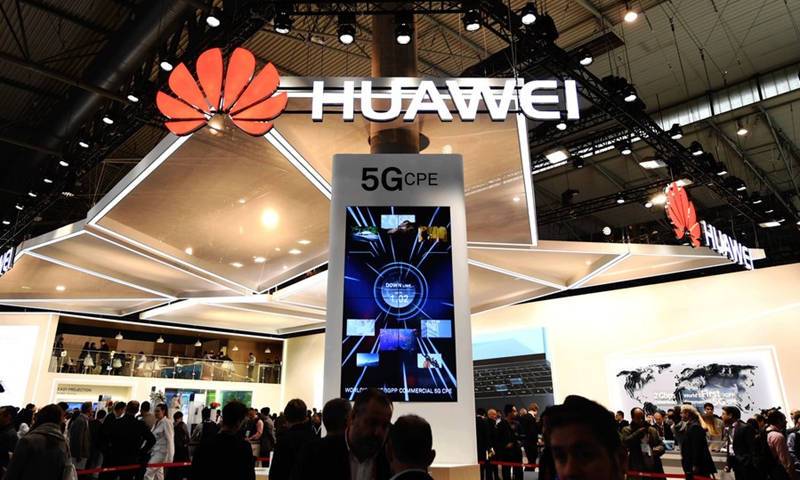By
Published: Oct 12, 2021 08:11 PM
Photo taken on Feb. 26, 2018 shows a screen displaying the 5G technology at the booth of China's telecom giant Huawei during the 2018 Mobile World Congress (MWC) in Barcelona, Spain.(Photo: Xinhua)
Amid falling smartphone sales and a shrinking telecom market share globally, Chinese tech giant Huawei set up units in four new segments to boost technologies for customs and ports, smart highways, data centers and solar energy, as the US' sanctions against the company persist.
Following a unit for technologies in coal mining established earlier this year, the company has expanded its footprint into new areas by setting up four new "corps" on Monday, media reports said, citing a document published on Huawei's internal employee community platform.
The internal "corps," in parallel with three other primary business units at Huawei (carrier network business, enterprise business and consumer business), are being personally planned and supervised by Huawei's founder Ren Zhengfei, according to a report on financial news website stcn.com.
Amid the US sanctions, which have banned Huawei's from access to chips from US suppliers, industry observers said that Huawei had to make such transformations to survive.
Its revenue has declined for three straight quarters. In terms of global smartphone market share, Huawei's share plunged from 17 percent in the first quarter of 2020 to 4 percent in the same quarter this year, according to Counterpoint Research.
"Huawei's consumer and smartphone segments face huge pressure and are retreating. It's shifting to grow its businesses and services for enterprises by picking industries that will see a fast digital transformation with great value, such as coal mining, port operations and photovoltaic plants," Ma Jihua, a veteran telecommunication industry analyst, told the Global Times on Tuesday.
In an interview with the Xinhua News Agency in February, Ren said that in the 5G era, telecom networks mainly connect enterprises, such as airports, wharfs, coal mines, steel plants, auto factories and aircraft manufacturing.
"These are areas we were not familiar with, so we set up joint laboratories in every industry to learn about the demand from these sectors," Ren said.
However, Ma said that it will be difficult for Huawei to revive its revenue in the short term, and the main aim is to maintain the current level of earnings.
"Serving enterprises means high profits. As long as Huawei remains profitable, its research and development (R&D) capability will be retained," Ma noted.
According to a ranking of Chinese private enterprises' R&D input released on Monday, Huawei was No.1 with an annual input of 141.9 billion yuan ($21.99 billion), surpassing the sum of three Chinese tech behemoths - Alibaba, Tencent and Baidu.
"The motivation for Huawei's efforts to develop in vertical industries comes from its clear judgment: it has to go through a tough time longer than it expected previously," Ma said, adding that the return of Huawei's Meng Wanzhou does not signal the US is relaxing its crackdown on Huawei, as the Biden administration's aim to contain China's tech growth hasn't changed.
Chinese telecoms giant Huawei Technology set up new business units focusing on providing smart services to ports, highways, data networks and solar plants, tech website TMT Post reported Tuesday, citing internal documents.
The establishment of the new organizations is Huawei's latest move toward diversification and follows the founding of a business unit for coal mining in February.
The report said the four business units would run parallel to Huawei's three major business groups (BG) – carrier network BG, enterprise BG and consumer BG.
The company's founder Ren Zhengfei will oversee the organizations, it said.
Huawei has been expanding its business tentacles into diverse sections with its fast-growing 5G network amid U.S. restrictions on its operations. Last month, it announced a new
with a coal company under China Energy to digitize the mining industry, making it safer and faster.



